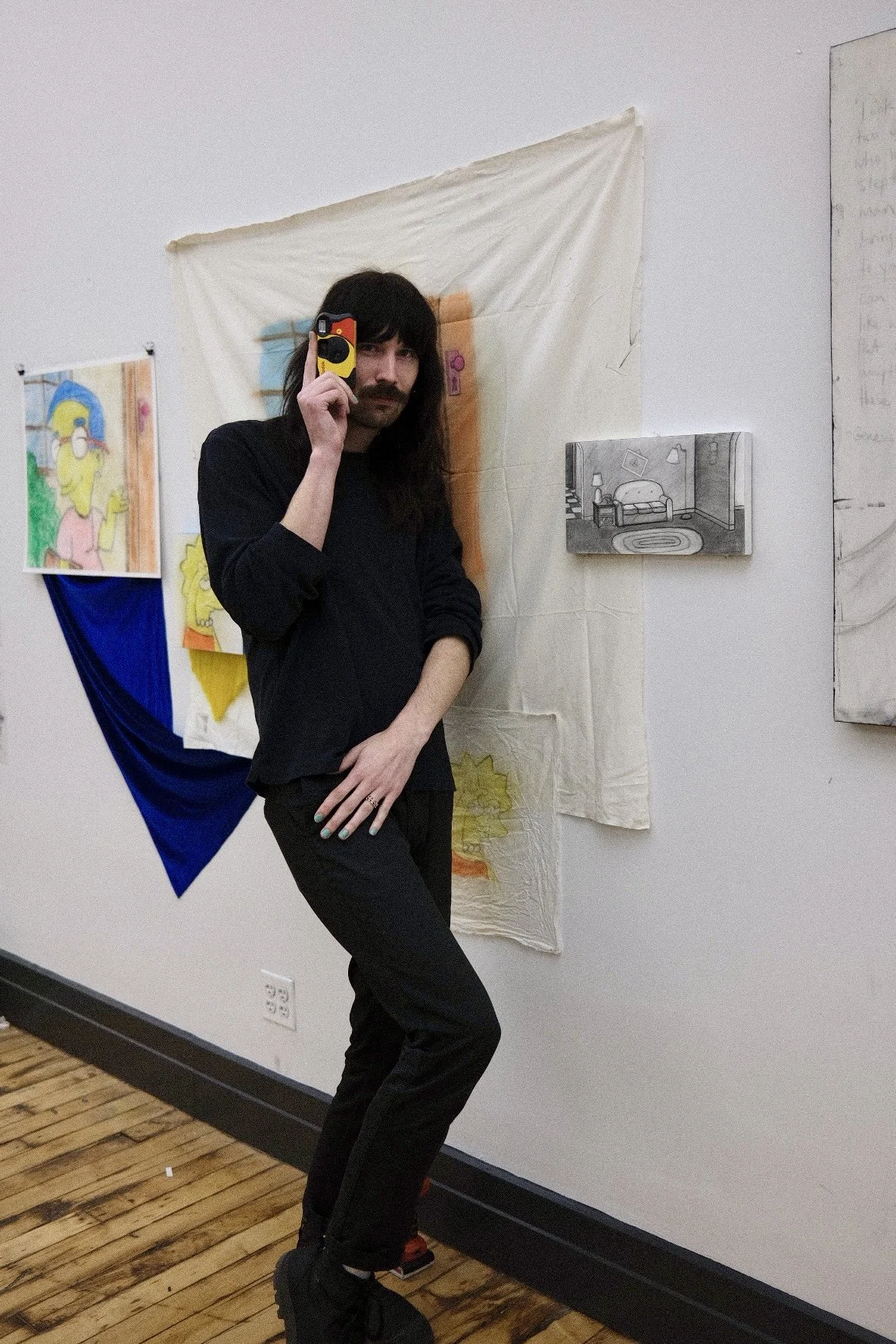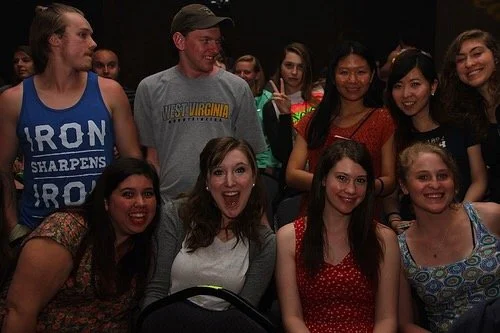
Culture
“We were kids playing with eternity.”
In interviews with former Cru members, one word was consistently repeated: “cult.”
Several ex-Cru members described the relationship between Cru and its members as one where students received community acceptance and upward mobility only if they put extensive time and energy into carrying out Cru’s stated mission.
Olivia Persing served with Cru at the University of Maryland in College Park from 2015 to 2017.
“People always joked that we’re a cult,” Persing said. “It was kind of weird because people would joke about it, but then [...] we kind of feel like it sometimes.”
Jakes Simmons was involved with Cru at the University of Maryland in Baltimore County from 2008 and 2012. He said his memories of Cru are hard to conjure back because the entire experience is “a really fractured part of my life.” He described Cru as a contributing source of trauma he has spent years trying to move past.
“We were kids playing with eternity,” he said.
Extreme burn-out
A leadership binder published by the Cru’s chapter at University of Maryland Baltimore County, provided by former student leader Luke J. Roberts, states:
“Ministry is always going to require sacrifice and we would ask you to carefully consider what role you serve in. Make sure your class/work/involvement schedules would grant you the capacity you need to serve.”
But many former Cru students reported that the intense pace of Cru’s activities resulted in extreme burn-out and fatigue.
“The more you’re sacrificing, the better you are in Cru,” Persing said.
Fred Harrell witnessed the toll Cru takes on students firsthand. Harrell was heavily involved with Cru during his time at the University of Florida from 1980 to 1985.
“The most important thing of all is winning souls,” Harrell said. “If you’re not catching fish full-time, you’re a second-class citizen.”
He said students were made to feel guilty if they didn’t consider going on staff. If someone was on the leadership team and missed a Cru retreat, Harrell said they risked being kicked off staff. “It was punitive,” he said. “It was abusive.”
Harrell eventually became disillusioned with Cru’s approach to ministry and left. He started a chapter of a similar campus ministry called Reformed University Fellowship — commonly shortened to RUF — at the University of Tennessee in Knoxville, which he led from 1990 to 1996. Cru had a chapter on the same campus. Harrell said as leader of RUF, he constantly butted heads with Cru.
Harrell said Cru students would come to his office in tears and tell him they were in danger of flunking out of school because of how much time and energy Cru demanded.
“They would come to me like Nicodemus in the night,” Harrell said. He estimates 25 to 30 Cru students came to him privately to confess these anxieties.
He said the students would tell him, “I don’t want you to tell anybody about this, but I’m falling to pieces — and I think it’s because of Campus Crusade for Christ.” Many times, he said, he heard them say, “My parents are really upset with me. They hate [Cru].”
Harrell said he would reassure the students, “Look, you don’t even have to come to RUF for me to be your friend.” The concept of friendship without conditions was so foreign to them, he said, that “they just about died — I mean, they couldn’t believe their ears.”
Harrell now serves as senior pastor of the City Church of San Francisco.
Sharing secrets for God
A student from Oakland University in Rochester, Michigan. recalled being thrown into Cru “hard and fast” from the moment she expressed interest in identifying as a Christian. She attended Cru from 2013 to 2021 and wishes to remain anonymous for privacy reasons.
“There really wasn’t a way out once you were in,” she said.
One semester after joining Cru, she found herself leading a Bible study. She was in a leadership position for two years, eventually becoming vice president of the campus chapter. After graduating, she joined full-time staff.
One of her primary responsibilities while in student leadership with Cru was participating in a program called “discipling.”
Discipleship involves being paired with a student leader, often someone only a couple of years older, who becomes the student’s “discipler.” The discipler will meet with their assigned students weekly for one-on-one check-ins about their spiritual health.
Disciplers are instructed to monitor their assigned students’ obedience, “personal purity,” “worry,” and “spirit-filled life,” according to a Cru-produced document provided by a former member. Disciplers are sometimes given tools to help them “track the progress” of disciples, according to a publication from Penn State Cru.
According to multiple former members, students felt pressured to confide vulnerable personal information to their disciplers — including eating disorders, family issues, alcohol abuse, pornography, and other sexual activity.
Nathan Bosak attended Cru at the California University of Pennsylvania for the duration of his 2021 school year. Bosak remembers feeling “compelled to talk about my personal struggles” with his discipler, describing the relationship as “transactional.”
Bosak said after Cru’s large group meetings on Thursday nights, sometimes he was invited to join a small offset of members for an unadvertised gathering where they would plan next week’s activities. Sometimes, he said, these meetings would devolve into “gospel gossip” about other members’ personal struggles.
Several former members reported that what they shared about their lives could affect their upward mobility within Cru. Sharing about a struggle with sexual celibacy, for example, could mean being turned down for coveted leadership opportunities.
Yet students still shared. “It was nice to feel like someone was interested in your life,” Olivia Persing said.
In her two and a half years of student leadership, the former Cru member from Oakland University discipled multiple women and was, in turn, discipled by a Cru staff member. She said the pressure to confess perceived sins only mounted when she joined staff.
“There is an expectation that there is a discipler staff person you tell everything to,” she said.
She recalled confiding in a female staff discipler that she wasn’t in a healthy place to pursue dating and was beginning to think she might not be interested in men. She alluded to having been sexually assaulted before college and told her discipler she had not yet fully processed the incident.
She said her discipler responded by questioning the legitimacy of what she shared. She was encouraged to share her sexual assault and the PTSD diagnosis she had recently received with the entire 15-person leadership team at her campus’s Cru.
“If it’s happening to you, it’s your responsibility to share it so that you can use your story to glorify God,” said Kiera Malloy, a former Cru member from the College of Creative Studies in Detroit, Michigan.
Targeted isolation
The intensity of Cru’s activities also affects the lives of its members’ loved ones, according to multiple former members.
“I was born into it,” said Zac Thompson, a nonbinary artist from New York who was born to two full-time Cru staff members. Their parents joined Cru in the 1970s and spent 40 years evangelizing on campuses nationwide and abroad before retiring.
“Growing up, my parents had better relationships with these college students than they ever did with their actual kids,” Thompson said. “There was never a time where some random college kid wasn't crashing at our house for like a week or a month.”
The youngest of five children, Thompson said Cru consumed their entire family’s life. “I could have led a whole Cru seminar when I was twelve, because I knew everything,” they said.
Thompson’s parents also conducted couples’ counseling sessions for Cru members who were in a relationship, engaged, or married.
Cru staff members are expected to work alongside their spouses, several former members said. Although there is no official Cru rule requiring married couples to share staff status, Thompson said that in practice, “both partners have to be on it.”
Casey Fiore, who attended Cru at the University of Wisconsin at Madison from 2010 to 2012, said she recalls attending a senior retreat called “Life Ops,” where Cru presented students with different life paths they could choose to pursue after college — with a strong emphasis on joining staff. Fiore said her peers jokingly dubbed the retreat “Wife Ops.”
“Everyone who was in a relationship would go together and end up having a conversation about whether they get married,” Fiore said. “It was so jarring.”
Fiore said the pressure Cru placed on her and her peers to deepen their involvement with the organization eclipsed all other priorities in her life. Balancing a full-time college schedule with Cru activities was exhausting, she said, and she “hated” mission trip fundraising most of all. “The entire thing was so uncomfortable,” she said.
Gloria Beth Amodeo, a former member of Cru’s Fairleigh Dickinson University chapter, said Cru leadership encouraged her to “target” her non-Christian friends and try to win them over. If a friend was unwilling to give their life to Jesus, she said she was told to distance herself from them.
The most frightening part for Amodeo came when she was told to cut off her relationship with her mother because she “wasn’t good for her.”
No questions allowed
Rebecca Carey, who was active with Cru at the University of Texas in San Antonio from 2015 through 2017, described the campus group as a “box culture.”
“You can question as much as you want within the box,” they said, “but you can’t step outside of it.”
Carey said they had friends who asked probing questions and were made to feel “very much rejected from Cru.”
Fred Harrell said he felt similarly. “I’m a straight white man,” he said, “and I still felt totally marginalized within Cru because I asked questions.”
One former member of Oakland University’s chapter spoke about repressing her sexuality for fear of losing her status as a staff member. “I was so much more scared to lose my job than I was to not live as who I actually was,” she said.
Mimi Cole was a member of Vanderbilt University’s Cru from 2016 through 2017. Cole described Cru as a place unwilling to allow open dialogue and exploration of ideas among students. She said she was deeply troubled by the lack of inquisitiveness Cru permitted.
“To tell people they’re going to hell and they can’t explore any other beliefs because it’s wrong, it’s bad, it’s leading you astray, it’s the devil — I find that really manipulative,” Cole said.
Nathan Bosak said at times he would look around the room during Cru meetings and wonder, “Is this not a cult?”
For members and staff who found community within the organization, leaving Cru life behind can be a massive sacrifice, according to multiple former members. Many ex-members described being swiftly cut off from friends they had worked alongside and evangelized with for years.
“It was definitely a cult,” Zac Thompson said. “Kids are going to believe whatever you tell them.”
Looking back on their time with Cru, Zac Thompson describes the “ritual aspects,” “colonizing,” and “grooming” they witnessed in Cru as stereotypical of a cult environment.
(Courtesy of Zac Thompson)
Cru interns pose together outside of a church.
(Courtesy of Rachel Duryea)
Students pose during a spring“Big Break” retreat put on by Cru’s West Virginia University chapter.
(Courtesy of Rachel Duryea)
Former Cru member Mimi Cole described her time with Cru as “a hot mess.” She said it’s “hard to see people still in it and still supporting something so harmful.”
(Courtesy of Mimi Cole)
Screenshot from a leadership binder by Cru’s chapter at the University of Maryland Baltimore County showing the top of Cru’s chain of command.
(Courtesy of Luke J. Roberts)
Screenshot of a questionnaire Cru leaders give to disciples at their first meeting to evaluate what areas of their spiritual life they “need to work on,” according to Rachel Duryea.
(Courtesy of Rachel Duryea)
Listen to Fred Harrell describe the extreme burn-out Cru students experienced while involved with Cru’s chapter at University of Tennessee in Knoxville.

“The more you’re sacrificing, the better you are in Cru.”
— Olivia Persing, former Cru member





